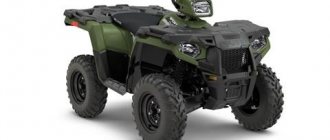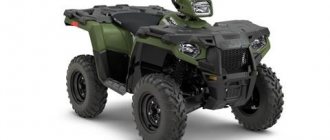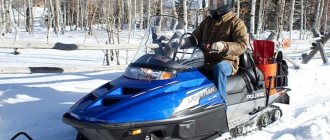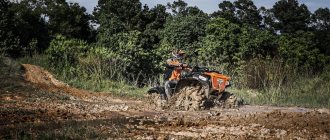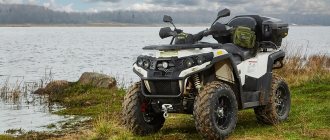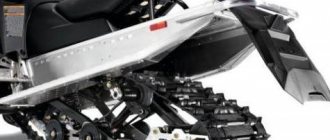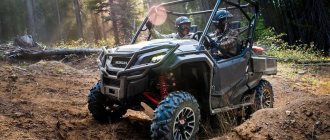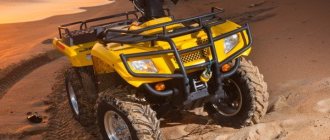I have witnessed many epic battles in my life. Tyson vs. Holyfield, San Diego Chargers vs. Oakland Raiders, spy vs. spy. The list goes on and on, but when Polaris released the Scrambler 850 HO XP LE earlier this year, I knew it would soon be adding another item. Before this machine, Can-Am had a strong hold on the sport-utility ATV market, which the company conquered in 2008 when it first introduced the Renegade 800 X xc. No other manufacturer could produce a utilitarian ATV that was ready to go straight from the showroom to the racing circuit. In addition to this, the ATV was equipped with Fox Racing shock absorbers, beadlock wheels and had a sporty color scheme. The car immediately caught the fancy of the racing community. Now, five years later, the engine capacity has been increased to 1000 cm3 and it still remains a favorite among fans of extreme driving.
Not wanting to be left behind, Polaris set out to develop an ATV that could not only compete with the Renegade in the ever-growing sport utility ATV market, but knock it off its pedestal. The Scrambler 850 HO XP LE is an all-new, ground-up machine equipped with an 850cc twin-cylinder EFI engine, a sports exhaust system, Electric Power Steering (ESP), Fox Podium X adjustable shock absorbers and 14-inch wheels wrapped in Carlisle tires. We had the opportunity to test this car last August. It impressed us greatly with its performance and handling, and also got us thinking about a potential showdown between these two monsters.
The battleground was Glen Helen, where we had access to miles of GP tracks, tight technical sections with wooden barriers, rocky sand sections and a motocross track where we could truly test these powerful machines. To make sure that each ATV gets a fair evaluation, I invited several test riders, ranging from beginners and enthusiasts to former pros and A-Class racers who competed in WORCS competitions.
Polaris Scrambler 850
The Scrambler 850 is a sport-utility ATV that does not differ in basic components (engine, transmission and chassis) from the Sportsman 850 XP. The 4-stroke 2-cylinder engine with a volume of 850 cubic centimeters with a single camshaft and electronic injection system has a liquid cooling system, and two balancing shafts ensure smooth operation of the engine. The ATV has a sport-tuned exhaust system that produces a luxurious, but not too loud sound. As stated, the engine power is 77 horsepower.
The PVT (Polaris Variable Transmission) transmission is similar to that on the Sportsman, with neutral, high and low gears, as well as reverse and a parking brake. If the hill where you decide to stop is too steep, pull the lever and the ATV wheels will firmly lock into place. Powering the Scrambler is Polaris On-Demand True All Wheel Drive.
The Scrambler XP 850 features double wishbones front and rear and Sachs shocks at all four corners. 9 inches (22.85 cm) of front suspension travel and 10.25 inches (26 cm) of rear suspension guarantee comfort on the road and no serious consequences over bumps. Ground clearance is almost 28 centimeters.
Specifications
| Model type | Sports |
| Price | |
| Year | 2015 |
| Brand | Polaris |
| Country of origin | USA |
Engine | |
| engine's type | Row |
| Cylinders | 2 |
| Number of bars | 4 |
| Power | 77 hp / 57.5 kW |
| Cooling | Liquid |
| Number of valves | 8 |
| Number of valves per cylinder | 4 |
| Valve configuration | SOHC |
| Cylinder diameter | 87 mm |
| Piston stroke | 71.5 mm |
| Engine capacity | 850 cm3 |
| Compression ratio | 11:1 |
| Starter | Electric |
| Fuel type | Petrol |
| Injector size | 42 mm |
Transmission | |
| Type | Variable speed drive |
| Drive (front wheels) | Shaft |
| Drive (engine/transmission) | Belt |
| Brand | Polaris Variable |
Wheels and tires | |
| Wheel material | Steel |
| Front tire diameter | 26 inches |
| Rear tire diameter | 26 inches |
| Tire brand | Maxxis |
| Front tire width | 80 mm |
| Front wheel diameter | 14 inches |
| Rear tire width | 100 mm |
| Rear wheel diameter | 14 inches |
| Front tire | 26×8-14 |
| Rear tire | 26×10-14 |
Suspension | |
| Suspension type | Independent double A-arm |
| Front suspension travel | 229 mm |
| Rear suspension travel | 260 mm |
| Number of rear shock absorbers | 2 |
| Rear suspension material | Steel |
Dimensions and filling containers | |
| Length | 2091 mm |
| Width | 1230 mm |
| Height | 1230 mm |
| Wheelbase | 1346 mm |
| Turning radius | 2.1 m |
| Ground clearance | 290 mm |
| Dry weight | 333 kg |
| Traction force | 680 kg |
| Load capacity | 131 kg |
| Tank capacity | 19.9 l |
| Engine displacement to weight | 1.16 cm3 |
| Seat height | 890 mm |
| Towbar size | 1.3 inches (3.3 cm) |
| Rear hitch type | Receiver |
Opinions
In terms of ergonomics, the two machines are almost equal. Both ATVs seemed very comfortable to all pilots. The Scrambler received a little more praise for its sportier ride feel due to its low-profile seat, while the Renegade's was more couch-like and felt very heavy while riding.
The clear winner in brake control is the Renegade. Everyone felt that the Scrambler's rear brake pedal was very small and placed too far forward, making it difficult to find quickly. In addition, pilots did not like the single brake lever on the left handlebar, compared to the Renegade's two independent brake levers. However, the Scrambler turned out to have a more advantageous throttle button. Drivers admitted that this is “the softest and most comfortable option they have encountered in a long time.” The Scrambler lost some points for its shifter. According to the general opinion, in order to move it, it was necessary to apply too much force, and then suddenly release it. The Renegade's shifter moved freely, and finding the right gear was much easier thanks to the artwork on the housing showing all the positions.
Like all the test riders I've dealt with, our team members first hit the gas pedal to get a feel for the machine's power, and they were all pleasantly surprised by both ATVs. The Renegade's 1000cc heart produces 82 horsepower, and you'll feel every bit of it as soon as you step on the gas. There's no shortage of torque, but that kind of power coupled with the sharp factory settings of the continuously variable transmission requires special attention from the driver. In terms of engine displacement, the Scrambler, with its 850 cm3, naturally lags behind, but its engine is only 5 horsepower weaker than that of the Renegade. The Polaris' continuously variable transmission operates smoother, resulting in less fatigue for riders, and the ATV overall feels more rider-friendly. In the acceleration test, it reached top speed a little faster than the Renegade, but ultimately the engine size advantage played a role in allowing the Renegade to pass its rival.
With such high power, cars must be equipped with equally good braking systems to stop safely. Here, our testers unanimously chose the Can-Am Renegade. When it came to testing the effectiveness of the brakes, every single pilot said that they had to literally stand on the rear brake pedal to stop. In addition, the brakes quickly overheated. In addition, no one liked the single brake lever on the left side of the steering wheel. Ultimately, the team came to the conclusion that if you are making a sports utility car, the braking system must match it. A single handlebar brake lever and a single rear disc brake simply don't meet the demands of this car under extreme use. When it came to the Can-Am Renegade's braking system, testers were delighted with its performance and wished that its competitor did it just as well. “This thing has real ship anchors instead of brakes,” commented one of the pilots. Independent, convenient levers for the front and rear brakes on the steering wheel, as well as disc brakes on all four wheels, make it easy to stop the ATV in any conditions.
When comparing the handling of the two vehicles, the Polaris Scrambler leaves its opponent far behind. Even without changing the suspension settings on each car, drivers felt that the Scrambler handled very predictably. “It seems that on the Renegade you suggest which direction to turn, and the ATV reluctantly agrees, while the Scrambler unquestioningly obeys all commands,” one driver described his feelings. Finding that the Renegade's stock settings were too firm, we removed 10 turns of preload at the front and four at the rear, which finally got the suspension moving. We then made some compression changes and also retuned the fully adjustable Fox shocks. But even all this did not allow us to get closer to the Scrambler's handling characteristics.
Another significant advantage of the Scrambler is the 14-inch wheels instead of the 12-inch wheels on the Renegade. Low-profile tires with little sidewall forced the suspension to do all the work, compared to the Renegade's soft tires, which leaned the car too much in tight corners. Both ATVs were equipped with EPS, but no one seemed to care about them. However, several drivers liked the Renegade's ability to adjust the electric power steering.
Polaris Scrambler 400 (500)
| Model type | Sports |
| Price | |
| Year | 2006 |
| Brand | Polaris |
| Country of origin | USA |
Engine | |
| engine's type | Single cylinder |
| Number of bars | 4 |
| Cooling | Liquid |
| Number of valves | 4 |
| Number of valves per cylinder | 4 |
| Valve configuration | DOHC |
| Cylinder diameter | 92 mm |
| Piston stroke | 75 mm |
| Engine capacity | 499 cm3 |
| Compression ratio | 10:2 |
| Starter | Electric / Manual |
| Fuel type | Petrol |
| Carburetor size | 40 mm |
| Carburetor brand | Mikuni |
Transmission | |
| Type | Variable speed drive |
| Drive (front wheels) | Shaft |
| Drive (engine/transmission) | Belt |
| Brand | Polaris Variable Transmission (PVT) |
Wheels and tires | |
| Wheel material | Steel |
| Front tire diameter | 23 inches |
| Rear tire diameter | 22 inches |
| Front tire width | 70 mm |
| Front wheel diameter | 10 inches |
| Rear tire width | 110 mm |
| Rear wheel diameter | 10 inches |
| Front tire | 23×7-10 |
| Rear tire | 22×11-10 |
Suspension | |
| Front suspension type | MacPherson strut |
| Front suspension travel | 208 mm |
| Rear suspension type | Pendulum |
| Rear suspension travel | 267 mm |
| Rear suspension material | Steel |
Dimensions and filling containers | |
| Length | 1905 mm |
| Width | 1168 mm |
| Height | 1194 mm |
| Wheelbase | 1219 mm |
| Turning radius | 2.07 m |
| Ground clearance | 140 mm |
| Dry weight | 259.5 kg |
| Traction force | 386 kg |
| Tank capacity | 13.2 l |
| Engine displacement to weight | 0.87 cm3 |
| Seat height | 864 mm |
Results
With eye-opening, hair-raising, blood-stirring power, the 2014 Scrambler XP 1000 LE is an adrenaline junkie's dream. But the skeptic in me says that too much is not always a good thing. However, the other side of me whispers that this car is one of the best ways to spend an honestly earned $13,000.
pros
- Very fast. Uiiiiiiiii!!!!!!
- Adjustable Fox shocks provide a smooth ride
- Electric power steering will allow you to ride all day long without losing your hand
Polaris Scrambler XP 1000 EPS
The 2014 Polaris Scrambler XP 1000 is essentially a souped-up version of the Scrambler XP 850 LE. Like the 850 model, the ATV comes standard with electric power steering, 8-spoke cast aluminum wheels, a front bumper, hand guards, LED headlights, a digital instrument panel and Fox Podium X 2.0 shock absorbers. The chassis and body are the same for all Scrambler models, but only the Scrambler 1000 is available in a striking black, white and red color scheme.
To get the most out of the 952cc engine, Polaris created and installed a new, more efficient stainless steel dual exhaust system. Thanks to it and the increased engine capacity, power increased from 77 horsepower on the Scrambler 850 to 89 horsepower on the XP 1000 EPS.
Specifications
| Model type | Sports |
| Price | |
| Year | 2015 |
| Brand | Polaris |
| Country of origin | USA |
Engine | |
| engine's type | Row |
| Cylinders | 2 |
| Number of bars | 4 |
| Power | 89 hp / 66.4 kW |
| Cooling | Liquid |
| Number of valves | 8 |
| Number of valves per cylinder | 4 |
| Valve configuration | SOHC |
| Cylinder diameter | 90.5 mm |
| Piston stroke | 74 mm |
| Engine capacity | 952 cm3 |
| Compression ratio | 11:1 |
| Starter | Electric |
| Fuel type | Petrol |
| Injector size | 42 mm |
Transmission | |
| Type | Variable speed drive |
| Drive (front wheels) | Shaft |
| Drive (engine/transmission) | Belt |
| Brand | Polaris Variable Transmission (PVT) |
Wheels and tires | |
| Wheel material | Aluminum |
| Front tire diameter | 26 inches |
| Rear tire diameter | 26 inches |
| Tire brand | Carlisle |
| Front tire width | 80 mm |
| Front wheel diameter | 14 inches |
| Rear tire width | 100 mm |
| Rear wheel diameter | 14 inches |
| Front tire | 26×8-14 |
| Rear tire | 26×10-14 |
Suspension | |
| Suspension type | Independent double A-arm |
| Front suspension travel | 229 mm |
| Rear suspension travel | 260 mm |
| Number of rear shock absorbers | 2 |
| Rear suspension material | Steel |
Dimensions and filling containers | |
| Length | 2091 mm |
| Width | 1230 mm |
| Height | 1230 mm |
| Wheelbase | 1346 mm |
| Ground clearance | 290 mm |
| Dry weight | 338 kg |
| Traction force | 680.4 kg |
| Load capacity | 131 kg |
| Tank capacity | 19.9 l |
| Engine displacement to weight | 1.24 cm3 |
| Seat height | 890 mm |
| Towbar size | 1.3 inches (3.3 cm) |
| Rear hitch type | Receiver |
First impressions
When you see these cars next to each other, only one word comes to mind - massive.
These are simply huge ATVs with a very impressive appearance. When I asked for opinions on each quad's appearance, most agreed that the Can-Am looked better, thanks to its much sportier body. The Polaris was let down by its not-so-great compact front end. However, appearances can often be deceiving. Although the Renegade appears heavier than the Scrambler, it is actually nearly 45 kilograms lighter. All testers sat in both cars to familiarize themselves with the controls and immediately noted differences in instrument panel accessibility. Polaris' gauges are located in the middle of the steering wheel and look directly at the driver, while in the case of the Renegade, the instrument panel is built into the front of the body and is partially obscured by the steering wheel. “While driving a car like these requires your full attention to be on the road, the driver needs to be able to easily glance at the instruments, and that's simply not possible on the Renegade,” one tester who drove a Can-Am for the past year told us. . Once everyone had donned their safety gear, I gave them free rein to do laps on both ATVs. In my opinion, the best way to get good reviews is to not limit drivers and let them do whatever they want. After a full day of riding, these guys had formed their opinion and were ready to surprise me with their preferences.
Where to buy Polaris Scrambler and how much parts cost
New or used Scrambler ATVs can be bought in Moscow at the following prices (the cost varies depending on the technical condition of the equipment, year of manufacture and the need for delivery of goods):
- Scrambler XP 1000 2022 - 1,264,000 ₽ ($21,000);
- Polaris Scrambler 850 XP – 750,000 ₽ ($12,500);
- Polaris Sportsman 500 2004 – 270,000 ₽ ($4,500).
Cost of popular spare parts
| Muffler | 179,000 rub. | Buy |
| Air flow/supply sensor | 1891 rub. | Buy |
| temperature sensor | 5415 rub. | Buy |
| Carburetor assembly | 19855 rub. | Buy |
| Universal mirrors | 1890 rub. | Buy |
| Driven variator crown | 4370 rub. | Buy |
| Carburetor to cylinder adapter | 5073 rub. | Buy |
| ATV winch | 25172 rub. | Buy |
| Piston kit STD 92 mm | 8265 rub. | Buy |
| Shaft bearing | 1841 | Buy |
| Snorkel SnorkelYourAtv | 28800 rub. | Buy |
| Snorkel for XP850 | 34880 rub. | Buy |
| Bent arms | From 10,000 to 20,000 rubles. | Buy |
Peculiarities
The 2014 Scrambler XP 1000 LE has a rear rack that can hold about 25 pounds and a small integrated front rack. It would be great if Polaris gave the car a front storage compartment like the Sportsman line and eliminated the rear compartment entirely. The C-pillar seems like a cheap and ill-thought-out addition. Due to the position of the muffler, it is mounted too high, almost 5 centimeters above the rear seat. By squeezing the gas all the way, you risk hitting your back against it.
The limited edition Scrambler features a powerful lighting system with two white LED headlights. They are very bright and with a beautiful white glow, you will look very cool when you pull into camp. In addition, the ATV has an interesting digital instrument panel with an analog speedometer, digital odometer, tachometer, two tripmeters, an hour meter, fuel indicators, four-wheel drive mode, diagnostic and transmission indicators, as well as a power outlet.
